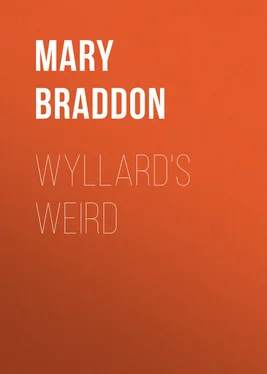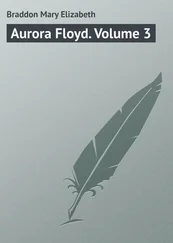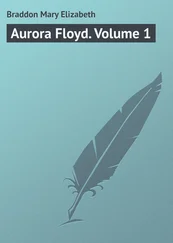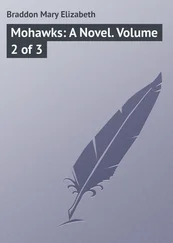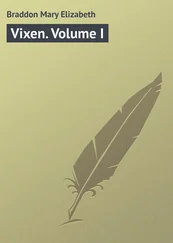Mary Braddon - Wyllard's Weird
Здесь есть возможность читать онлайн «Mary Braddon - Wyllard's Weird» — ознакомительный отрывок электронной книги совершенно бесплатно, а после прочтения отрывка купить полную версию. В некоторых случаях можно слушать аудио, скачать через торрент в формате fb2 и присутствует краткое содержание. Издательство: Иностранный паблик, Жанр: foreign_antique, foreign_prose, на английском языке. Описание произведения, (предисловие) а так же отзывы посетителей доступны на портале библиотеки ЛибКат.
- Название:Wyllard's Weird
- Автор:
- Издательство:Иностранный паблик
- Жанр:
- Год:неизвестен
- ISBN:нет данных
- Рейтинг книги:3 / 5. Голосов: 1
-
Избранное:Добавить в избранное
- Отзывы:
-
Ваша оценка:
- 60
- 1
- 2
- 3
- 4
- 5
Wyllard's Weird: краткое содержание, описание и аннотация
Предлагаем к чтению аннотацию, описание, краткое содержание или предисловие (зависит от того, что написал сам автор книги «Wyllard's Weird»). Если вы не нашли необходимую информацию о книге — напишите в комментариях, мы постараемся отыскать её.
Wyllard's Weird — читать онлайн ознакомительный отрывок
Ниже представлен текст книги, разбитый по страницам. Система сохранения места последней прочитанной страницы, позволяет с удобством читать онлайн бесплатно книгу «Wyllard's Weird», без необходимости каждый раз заново искать на чём Вы остановились. Поставьте закладку, и сможете в любой момент перейти на страницу, на которой закончили чтение.
Интервал:
Закладка:
"Julian looks tired and anxious," she said to her cousin, who stood smoking a cigarette just outside the window.
"You can't be surprised at that," answered Bothwell. "That business on the railway was enough to make any man feel queer. I shall not forget it for a long time."
"It must have been an awful shock. And men with strong features and powerful frames are sometimes more sensitive than your fragile beings with nervous temperaments," said Dora. "I have often been struck with Julian's morbid feeling about things which a strong man might be supposed to regard with indifference."
"He is a deuced good fellow," said Bothwell, who had been more generously treated by his cousin's husband than by any of his own clan. "Won't you come for a turn in the garden? I won't start another cigarette, if you object."
"You know I don't mind smoke," she answered, joining him. "Why, how your hand shakes, Bothwell! You can hardly light your cigarette."
"Didn't I say that I was upset by that business? I don't suppose I shall sleep a wink to-night."
They walked in the rose-garden for more than an hour. Garden and night were both alike ideal. An Italian garden, with formal terraces, and beds of roses, and a fountain in the centre, a bold and plenteous jet that rose from a massive marble basin. Roses, magnolia, jasmine, and Mary-lilies filled the air with perfume. The moon had changed from gold to silver, and was high up in heaven.
It was everybody's moon now, silvering the humble roofs of Bodmin, shining over the church, the gaol, the lunatic asylum, and shining on that humble village inn five or six miles away, beneath whose rustic roof the stranger was lying, with no one to pray beside her bed.
Bothwell sauntered silently by his cousin's side. She, too, was silent, and felt no inclination to talk or to listen. She was glad to be out in the garden while her husband opened his letters. She knew there was a pile of correspondence waiting for him – such letters as devour the leisure of a country gentleman of wealth and high standing, letters for the most part uninteresting, and very often troublesome. It would take Julian Wyllard a long time to wade through them all. But when the stable clock struck twelve, Dora thought she might fairly hope to find the task finished.
"Good-night, Bothwell," she said. "I'll go and look for Julian."
The servants had all gone to bed, and the lamps had been extinguished, except in the hall and corridors. A half-glass door opened from the garden into the hall, and this was always left unbolted for the accommodation of Bothwell, who was fond of late saunterings in the grounds. The library was at the further end of the house, a superb room, filled with a choice collection of books, the growth of the last seven years; for Julian Wyllard was a new man in the county, and had only owned Penmorval during that period.
There was a good fire burning in the artistic tiled grate – a modern improvement upon the old arrangement in wrought iron. Mr. Wyllard had opened all his letters, and had evidently burned some of them, for an odour of calcined paper and sealing-wax pervaded the room.
He was sitting in a low chair beside the hearth, in a stooping attitude, deeply meditative, looking down at some object in his hands. He was so profoundly absorbed as to be unconscious of Dora's presence till she was standing close beside him.
The object which so engrossed his attention, which had led his thoughts backward to the faraway past, was a long tress of chestnut hair. He had wound it round his fingers – a smooth, silken tress, which flashed with gleams of gold in the cheery light of the fire.
"What beautiful hair!" said Dora gently, as she looked downward from behind his shoulder. "Whose is it, Julian?"
"It was my sister's," he answered.
"The sister who died so many years ago. Poor Julian! You have been sitting here alone, giving yourself up to sad memories."
"I came upon this auburn tress among some old papers just now, while I was looking for Martin's lease."
He rolled the hair up quickly, and flung it into the flaming coals.
"O Julian, why did you do that?" asked his wife reproachfully.
"What is the use of keeping such things, only to perpetuate sorrowful memories? God knows we have enough of our dead. They haunt us and plague us at every stage of life. We cannot get rid of them."
The bitterness of his tone jarred upon his wife's ear.
"My dearest, you are wearied and out of spirits," she said. "You have worked too long. Were your letters troublesome?"
"Not more so than usual, dear. Yes, I am very tired."
"And that dreadful event on the line has troubled you. Poor Bothwell is quite upset by it. I am so sorry for you, Julian," said his wife soothingly, leaning upon his shoulder, smoothing back the thick hair from the broad, full brow.
"My dear child, there is no reason to be sorry for me. Dreadful events are happening every day, all over the world. We hear of them, and feel how feeble a thing life is under such conditions as those on which we all hold our existence. This evening I happened to be brought face to face with a terrible death. That is all the difference."
CHAPTER II.
AFTER THE INQUEST
There was great excitement in Bodmin on the afternoon of the inquest; a delicious summer afternoon, which seemed made for quiet arcadian joys; an afternoon to be spent in day-dreams under forest boughs, or drifting lazily adown a placid stream; rather than for gathering together in a stifling tavern-parlour, listening to the droning accents of a police-constable, or the confused statements and innocent prevarications of a railway-porter. But it may be that the inhabitants of Bodmin had drunk their fill of the cup of pastoral joys, that they had had more than enough of heathery moorland and foxglove-bordered lane, dog-rose and honeysuckle, waving boughs and winding streams, and that this satiety made them flock to the little inn beyond Bodmin Road station, where they elbowed and hustled one another in the endeavour to get a good view of the Coroner and the witnesses.
An inquest was not in itself such a thrilling event. There had been inquests held in Bodmin which inspired neither curiosity nor excitement in the mind of the town. But this inquiry of to-day interested everybody. Who could tell what mystery – what story of falsehood and wrong – had gone before that sad, strange death? The report had gone about that the victim was a foreigner, and this gave a deeper note to the mystery. Why had she come to that spot to kill herself? or who had lured her there to murder her? These were the questions which were discussed in Bodmin freely that fair July morning; questions which gave birth to various wise and abstruse theories, every one of which seemed to the inventor thereof a most plausible explanation of this dark problem in human history.
"If anybody can throw light upon the business, Squire Heathcote is the man to do it," said Mr. Bate, grocer, general-dealer, and churchwarden.
Edward Heathcote was one of the most popular men within ten miles of Bodmin. He was a native of the soil, had been known to the neighbourhood from his childhood. He came of a race that was held in high honour, which had produced men famous with sword and gown in the days that were gone. Honour, courage, and all generous feelings were supposed to run in the blood of the Heathcotes. He had succeeded to a small estate and a fine old Grange, in which his forefathers had lived from generation to generation. In the deepest night of past ages there had been Heathcotes in the land. Thus, albeit he was by no means a rich man as compared with Julian Wyllard, he stood higher than the wealthy financier in the esteem of those good old conservatives who held that money is not everything. Mr. Wyllard was a new-comer, had bought Penmorval just before his marriage – choosing this part of the world for his residence because Theodora Dalmaine loved it, rather than for any leaning of his own. He was known to have made the greater part of his money himself – a low thing for a man to have done. Even commercial fortunes become hallowed after they have filtered from father to son for three or four generations. Thus, although he was altogether the most important personage in the neighbourhood, and belonged to the landed gentry by right of recent purchase, there were people who looked upon Julian Wyllard as a parvenu , and who were somewhat disposed to resent the weight which his wealth gave him in local affairs.
Читать дальшеИнтервал:
Закладка:
Похожие книги на «Wyllard's Weird»
Представляем Вашему вниманию похожие книги на «Wyllard's Weird» списком для выбора. Мы отобрали схожую по названию и смыслу литературу в надежде предоставить читателям больше вариантов отыскать новые, интересные, ещё непрочитанные произведения.
Обсуждение, отзывы о книге «Wyllard's Weird» и просто собственные мнения читателей. Оставьте ваши комментарии, напишите, что Вы думаете о произведении, его смысле или главных героях. Укажите что конкретно понравилось, а что нет, и почему Вы так считаете.
